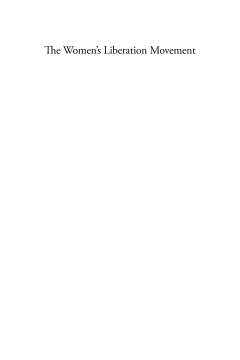
Additional Information
Book Details
Abstract
For over half a century, the countless organizations and initiatives that comprise the Women’s Liberation movement have helped to reshape many aspects of Western societies, from public institutions and cultural production to body politics and subsequent activist movements. This collection represents the first systematic investigation of WLM’s cumulative impacts and achievements within the West. Here, specialists on movements in Europe systematically investigate outcomes in different countries in the light of a reflective social movement theory, comparing them both implicitly and explicitly to developments in other parts of the world.
“This book is rich in content and thoroughly researched. Several chapters bring relatively un-known movement dynamics to an English-speaking audience for the first time. These contributions provide important empirical evidence of what the diversity of the many Western European Women’s Liberation Movements actually stand for, what they do, and how they develop.” · Susanne Zwingel, Florida International University
“Both exciting and very well-written, this book offers original empirical work on a range of core issues related to the Women’s Liberation Movements. It is based on multiple methods of case studies, and brings forward refreshing empirical material and methodological reflections. There are so many myths about feminism and WLM that claims and descriptions based on solid research, such as those offered by this collection, are essential.” · Beatrice Halsaa, University of Oslo
Kristina Schulz, PhD, is Senior Lecturer for Contemporary History and Migration History at the University of Berne. She is a specialist of Western feminist history in comparative perspective and is the author of a book on the French and German WLM: ‘Der lange Atem der Provokation.’ Die Frauenbewegung in der Bundesrepublik und in Frankreich (1968-1976). Together with Leena Schmitter and Sarah Kiani she published a source and archive guide about the Swiss Women’s Liberation Movement in 2014. With Magda Kaspar she is currently preparing an audio archive and interactive website about the feminist movement in Switzerland from the 1970s to the present.
Table of Contents
| Section Title | Page | Action | Price |
|---|---|---|---|
| Half Title | i | ||
| The Women's Liberation Movement | iii | ||
| Contents | v | ||
| Introduction — A Success without Impact? Case Studies from the Women's Liberation Movements in Europe | 1 | ||
| Part I — The Women's Liberation Movement and Institutional Change: Introductory Remarks | 15 | ||
| Chapter 1 — Women's Liberation Movement and Professional Equality: The Swiss Case | 19 | ||
| Chapter 2 — How the Women's Movement Changed Academia: A Comparison of Germany and the United States | 36 | ||
| Chapter 3 — Female Bodies—Fetal Subjects? New Reproductive Technologies, Feminist Claims, and Political Change in Switzerland in the 1970/1980s | 51 | ||
| Part II — Sharing Words: Introductory Remarks | 67 | ||
| Chapter 4 — Momone and the Bonnes Femmes; or Beauvoir and the MLF | 73 | ||
| Chapter 5 — Women and Words: Literary Practices as Collective Self-Discovery | 91 | ||
| Chapter 6 — Lesbian Vertigo: Living the Women's Liberation Movement on the Edge of Europe | 109 | ||
| Chapter 7 — Sexy Stories and Postfeminist Empowerment: From Häutungen to Wetlands | 129 | ||
| Part III — Identities at Stake: Gender, Race, Class: Introductory Remarks | 151 | ||
| Chapter 8 — Lesbianism as Political Construction in the French Feminist Context | 157 | ||
| Chapter 9 — Gender and Class in the Italian Women's Liberation Movement | 178 | ||
| Chapter 10 — \"Sisterhood Is Plain Sailing?\" Multiracial Feminist Collectives in 1980s Britain | 198 | ||
| Chapter 11 — Uneasy Solidarity: The British Men's Movement and Feminism | 214 | ||
| Part IV — Beyond National Boundaries: Introductory Remarks | 237 | ||
| Chapter 12 — Echoes of Ourselves? Feminisms between East and West in the Leningrad Almanac Woman and Russia | 243 | ||
| Chapter 13 — Cyberfeminism on the German-Speaking Net: Contestation beyond Binary Code | 261 | ||
| Part V — Thinking about Impact and Change: Concepts and Research Strategies: Introductory Remarks | 279 | ||
| Chapter 14 — The Myth and the Archives: Some Reflectionson Swedish Feminism in the 1970s | 285 | ||
| Chapter 15 — After the Protest: Biographical Consequences of Movement Activism in an Oral History of Women's Liberation in Britain | 298 | ||
| Chapter 16 — Writing the History of Feminisms (Old and New): Impacts and Impatience | 320 | ||
| Postscript | 337 | ||
| Index | 346 |
